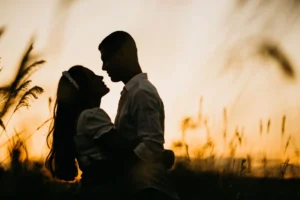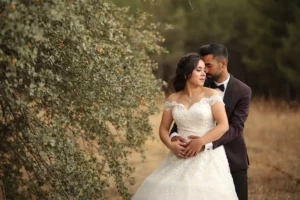OK, I’ll admit it: I am 22 years old and still a virgin. Not for lack of opportunity, my vanity hastens to add. Had I ever felt unduly burdened by my unfashionable innocence, I could have found someone to attend to the problem. But I never did.
Our mainstream culture tells me that some oppressive force must be the cause of my late-in-life virginity, maybe an inordinate fear of men or God or getting caught. Perhaps it’s right, since I can pinpoint a number of influences that have persuaded me to remain a virgin. My mother taught me that self-respect requires self-control, and my father taught me to demand the same from men. I’m enough of a country bumpkin to suspect that contraceptives might not be enough to prevent an unwanted pregnancy or disease, and I think that abortion is killing a baby. I buy into all that Christian doctrine of law and promise, which means that the stuffy old commandments are still binding on my conscience. And I’m even naive enough to believe in permanent, exclusive, divinely ordained love between a man and a woman, a love so valuable that it motivates me to keep my legs tightly crossed in the most tempting of situations.
Defining Sexuality Down
In spite of all this, I still think of myself as something of a feminist, since virginity has the result of creating respect for and upholding the value of the woman so inclined. But I have discovered that the reigning feminism of today has little use for it. There was a time when I was foolish enough to look for literature among women’s publications that might offer support in my very personal decision. (It’s all about choice, after all, isn’t it?) The dearth of information on virginity might lead one to believe that it’s a taboo subject. However, I was fortunate enough to discover a short article on it in that revered tome of feminism, Our Bodies, Ourselves.
The most recent edition of the book has a more positive attitude than the edition before it, in that it acknowledges virginity as a legitimate choice and not just a by-product of patriarchy. Still, in less than a page, it presumes to cover the whole range of emotion and experience involved in virginity, which, it seems, consists simply in the notion that a woman should wait until she’s really ready to express her sexuality. That’s all there is to say about it. Apparently, sexual expression takes place only in and after the act of genital intercourse. Anything subtler — like a feminine love of cooking or tendency to cry at the movies or unsuppressable maternal instinct or cultivation of a wardrobe that will turn heads or even a passionate good-night kiss — is deemed an inadequate demonstration of sexual identity. The unspoken message of Our Bodies, Ourselves is clear enough: as long as a woman is a virgin, she remains completely asexual.
Surprisingly, this attitude has infiltrated the thinking of many women my age, who should still be new enough in the web of lies called adulthood to know better. One of my most vivid college memories is of a conversation with a good friend about my (to her) bizarre aberration of virginity. She and another pal had been delving into the gruesome specifics of their past sexual encounters. Finally, after some time, my friend suddenly exclaimed to me, “How do you do it?”
A little taken aback, I said, “Do what?”
“You know,” she answered, a little reluctant, perhaps, to use the big bad V-word. “You still haven’t … slept with anybody. How do you do it? Don’t you want to?”
The question intrigued me, because it was so utterly beside the point. Of course I want to — what a strange question! — but mere wanting is hardly a proper guide for moral conduct. I assured my concerned friend that my libido was still in proper working order, but then I had to come up with a good reason why I had been paying attention to my inhibitions for all these years. I offered the usual reasons — emotional and physical health, religious convictions, “saving myself” till marriage — but nothing convinced her until I said, “I guess I don’t know what I’m missing.” She was satisfied with that and ended the conversation.
In one sense, sure, I don’t know what I’m missing. And it is common enough among those who do know what they’re missing to go to great lengths to insure that they don’t miss it for very long. In another sense, though, I could list a lot of things that I do know I’m missing: hurt, betrayal, anxiety, self-deception, fear, suspicion, anger, confusion and the horror of having been used. And those are only emotional aspects; there is also disease, unwanted pregnancy and abortion. As if to prove my case from the other side, my friend suffered a traumatic betrayal within a month or two of our conversation. It turned out that the man involved would gladly sleep with her, but refused to have a “real relationship” — a sad reality she discovered only after the fact.
The Power to Choose
According to received feminist wisdom, sexuality is to be understood through the twin concepts of power and choice. It’s not a matter of anything so banally biological as producing children, or even the more elevated notion of creating intimacy and trust. Sometimes it seems like sex isn’t even supposed to be fun. The purpose of female sexuality is to assert power over hapless men, for control, revenge, self-centered pleasure or forcing a commitment. A woman who declines to express herself in sexual activity, then, has fallen prey to a male-dominated society that wishes to prevent women from becoming powerful. By contrast, it is said, a woman who does become sexually active discovers her power over men and exercises it, supposedly to her personal enhancement.
This is an absurd lie. That kind of gender-war sexuality results only in pyrrhic victories. It’s a set-up for disaster, especially for women. Men aren’t the ones who get pregnant. And who ever heard of a man purchasing a glossy magazine to learn the secret of snagging a wife? Sacrifice and the relinquishing of power are natural to women — ask any mom — and they are also the secret of feminine appeal. The pretense that aggression and power-mongering are the only options for female sexual success has opened the door to predatory men. The imbalance of power becomes greater than ever in a culture of easy access.
Against this system of mutual exploitation stands the more compelling alternative of virginity. It escapes the ruthless cycle of winning and losing because it refuses to play the game. The promiscuous of both sexes will take their cheap shots at one another, disguising infidelity and selfishness as freedom and independence, and blaming the aftermath on one another. But no one can claim control over a virgin. Virginity is not a matter of asserting power in order to manipulate. It is a refusal to exploit or be exploited. That is real, and responsible, power.
But there is more to it than mere escape. There is an undeniable appeal in virginity, something that eludes the resentful feminist’s contemptuous label of “prude.” A virgin woman is an unattainable object of desire, and it is precisely her unattainability that increases her desirability. Feminism has told a lie in defense of its own promiscuity, namely, that there is no sexual power to be found in virginity. On the contrary, virgin sexuality has extraordinary and unusual power. There’s no second-guessing a virgin’s motives: her strength comes from a source beyond her transitory whims. It is sexuality dedicated to hope, to the future, to marital love, to children and to God. Her virginity is, at the same time, a statement of her mature independence from men. It allows a woman to become a whole person in her own right, without needing a man either to revolt against or to complete what she lacks. It is very simple, really: no matter how wonderful, charming, handsome, intelligent, thoughtful, rich or persuasive he is, he simply cannot have her. A virgin is perfectly unpossessable.
Of course, there have been some women who have attempted to claim this independence from men by turning in on themselves and opting for lesbian sexuality instead. But this is just another, perhaps deeper, rejection of their femaleness. The sexes rightly define themselves in their otherness. Lesbianism squelches the design of otherness by drowning womanhood in a sea of sameness, and in the process loses any concept of what makes the female feminine. Virginity upholds simply and honestly that which is valuable in and unique to women.
The corollary of power is choice. Again, the feminist assumes that sexually powerful women will be able to choose their own fates. And again, it is a lie. No one can engage in extramarital sex and then control it. Nowhere is this more apparent than in the moral nightmare of our society’s breakdown since the sexual revolution. Some time ago I saw on TV the introduction of the groundbreaking new “female condom.” A spokeswoman at a press conference celebrating its grand opening declared joyously the new freedom that it gave to women. “Now women have more bargaining power,” she said. “If a man says that he refuses to wear a condom, the woman can counter, fine, I will!” I was dumbstruck by her enthusiasm for the dynamics of the new situation. Why on earth would two people harboring so much animosity towards each other contemplate a sexual encounter? What an appealing choice they have been given the freedom to make!
The dark reality, of course, is that it is not free choice at all when women must convince men to love them and must convince themselves that they are more than just “used goods.” There are so many young women I have known for whom freely chosen sexual activity means a brief moment of pleasure — if that — followed by the unchosen side effects of paralyzing uncertainty, anger at the man involved, and finally a deep self-hatred that is impenetrable by feminist analysis. So-called sexual freedom is really just proclaiming oneself to be available for free, and therefore without value. To “choose” such freedom is tantamount to saying that one is worth nothing.
Admittedly, there are some who say that sex isn’t anything nearly so serious or important, but just another recreational activity not substantially different from ping-pong. I don’t believe it for a second. I learned most meaningfully from another woman the destructive force of sexuality out of control when I myself was under considerable pressure to cave in to a man’s sexual demands. I discussed the prospect with this friend, and after some time she finally said to me, “Don’t do it. So far in life you’ve made all the right choices and I’ve made all the wrong ones. I care enough about you that I don’t want to see you end up like me.” Naturally, that made up my mind. Sex does matter; it matters a lot; and I can only hope that those who deny it will wake up to their error before they damage themselves even more.
It is appalling that feminism has propagated lies so destructive to women. It has created the illusion that there is no room for self-discovery outside of sexual behavior. Not only is this a grotesque lie, but it is also an utterly boring one. Aside from its implied dismissal of all the world’s many riches outside the sexual domain, this false concept has placed stultifying limitations on the range of human relationships. We’re told that friendships between men and women are just a cover until they leap into the sack together. While romance is a natural and a commendable expression of love between women and men, it is simply not the only option. And in our sexually competitive climate, even romantic love barely deserves the title. Virginity among those seeking marital love would go far to improve the latter’s solidity and permanence, creating an atmosphere of honesty and discovery before the equally necessary and longed-for consummation. Where feminism sees freedom from men by placing body parts at their disposal in a bizarre game of self-deception, virginity recognizes the equally vulnerable though often overlooked state of men’s own hearts and seeks a way to love them for real.
It is puzzling and disturbing to me that regnant feminism has never acknowledged the empowering value of virginity. I tend to think that much of the feminist agenda is more invested in the culture of groundless autonomy and sexual Darwinism than it is in genuinely uplifting women. Of course, virginity is a battle against sexual temptation, and popular culture always opts for the easy way out instead of the character-building struggle. The result is superficial women formed by meaningless choices, worthy of stereotype, rather than laudable women of character, worthy of respect.
Preparing for Love
Perhaps virginity seems a bit cold, even haughty and heartless. But virginity hardly has exclusive claim on those defects, if it has any claim at all. Promiscuity offers a significantly worse fate. I have a very dear friend who, sadly, is more wordly-wise than I am. By libertine feminist standards she ought to be proud of her conquests and ready for more, but frequently she isn’t. The most telling insight about the shambles of her heart came to me once in a phone conversation when we were speculating about our futures. Generally they are filled with exotic travel and adventure and Ph.D.s. This time, however, they were not. She admitted to me that what she really wanted was to be living on a farm in rural Connecticut, raising a horde of children and embroidering tea towels. It is a lovely dream, defiantly unambitious and domestic. But her short, failed sexual relationships haven’t taken her any closer to her dream and have left her little hope that she’ll ever attain it. I must be honest here: virginity hasn’t landed me on a farm in rural Connecticut, either. Sexual innocence is not a guarantee against heartbreak. But there is a crucial difference: I haven’t lost a part of myself to someone who has subsequently spurned it, rejected it, and perhaps never cared for it at all.
I sincerely hope that virginity will not be a lifetime project for me. Quite the contrary, my subversive commitment to virginity serves as preparation for another commitment, for loving one man completely and exclusively. Admittedly, there is a minor frustration in my love: I haven’t met the man yet (at least, not to my knowledge). But hope, which does not disappoint, sustains me.
Copyright 1998 Sarah Hinlicky. All rights reserved.








